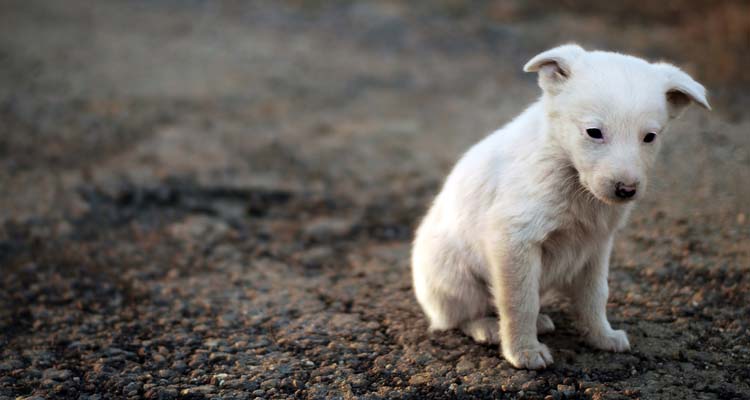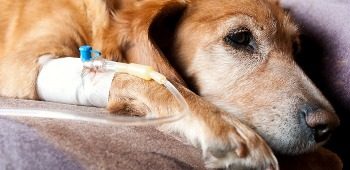What is it– Parvovirus is a virus that attacks dividing cells in the body, affecting the gastrointestinal tract the greatest. It is life threatening illness which can be prevented with a few simple vaccines.
Symptoms of Parvovirus-The big one is extreme diarrhea, typically bloody. There is also vomiting, lethargy, and loss of appetite. All of these lead to severe dehydration.
How it is transmitted-Parvo is transmitted through the feces from one dog to another. That can be through direct contact in the park, on the street, on a walk, or at any place that allows dogs. Indirect contact can be through food bowls, a persons shoes, or floors.
 Who is susceptible to parvo-Any dog that has not been fully vaccinated can potentially become infected with the virus. It is important that your puppy or new dog be vaccinated. If you don’t have concrete proof (actual veterinary certificates or records, don’t just take their word for it), then take them into your veterinarian to get up to date. Other dogs at risk are older dogs that may have a compromised immune system, or those dogs that have a medical reason that they should not be vaccinated. Puppies usually go to a puppy class for training and socialization. This is where there should be a strict clean up policy and a strict vaccination requirement. You should also only socialize with friends or family members dogs in a known area (your own yard) and only if the dog is vaccinated and not sick.
Who is susceptible to parvo-Any dog that has not been fully vaccinated can potentially become infected with the virus. It is important that your puppy or new dog be vaccinated. If you don’t have concrete proof (actual veterinary certificates or records, don’t just take their word for it), then take them into your veterinarian to get up to date. Other dogs at risk are older dogs that may have a compromised immune system, or those dogs that have a medical reason that they should not be vaccinated. Puppies usually go to a puppy class for training and socialization. This is where there should be a strict clean up policy and a strict vaccination requirement. You should also only socialize with friends or family members dogs in a known area (your own yard) and only if the dog is vaccinated and not sick.
What vaccines are needed-As a puppy, there are 3 vaccines, typically given at 8 weeks of age, 12 weeks of age and 16 weeks. This is when the puppy’s immunity starts to drop as they are no longer receiving natural antibodies from their mother. If the puppy has not nursed, then the veterinarian may recommend additional vaccines. They typically receive a DA2PP vaccine (distemper, adenovirus, parvovirus and parainfluenza) at each of those visits, with rabies being a single vaccine at their 4 month appointment. Additional vaccines to consider would be Bordetella (kennel cough), lyme, and leptospirosis. If the dog is over 16 weeks of age and vaccine history cannot be verified, then they receive one set of DA2PP + R with a booster of DA2PP 3-4 weeks later. Then they are considered fully vaccinated. If you have questions about your veterinarians protocol, I’m sure they or their staff will gladly help you figure it out for sure.
What happens if my pet becomes sick-Always, always, always call your veterinarian. As a previous veterinary receptionist, if I heard diarrhea in the same breath as puppy or new dog, then parvo pops into mind. The staff will usually ask for a fecal sample to come into the clinic, some vets may want to see the consistency, smell, amount mucous, etc, and if possible, carry your puppy in to avoid any possible spread of the virus in the clinic. If the veterinarian suspects parvo, then a simple test can usually be done in the clinic, with results obtained in about 10-15 minutes. The fecal sample may also be sent to the lab to look for additional parasites such as roundworm, coccidia and giardia.
My dog is positive for parvo, what now?-The veterinarian will likely get an estimate put together for a stay in the clinic on intravenous fluids, medications to help with vomiting and diarrhea, antibiotics, as well as others to combat fever, nausea, etc. The dog will be in isolation where anyone that goes inside the room has to wear a coat, and step in a solution to avoid spread on their shoes. Any item that goes into that room that doesn’t need to come out, usually stays in. Depending on how the pup does while they are in the clinic, it may only a few days or so, or it may be a week or longer. Be prepared though, that even with extensive medical treatment, some pups may not survive parvovirus.
What do I need to do now-While your pet is in treatment, now is a great time to clean the house. A bleach solution can be used to wash the floors, food bowls, etc. Disinfect the areas thoroughly for at least 10 minutes. Any toys should also be disinfected as well for 10 minutes, but if it cannot be, then it should get thrown out. Bedding should also be washed in a bleach solution. This is mostly to avoid bringing the virus outside where other dogs can potentially become infected. Your pup has it, and now will have sufficient antibodies for it. When your dog comes home, follow your veterinarians home care instructions, including giving medications as directed for the entire length of the prescription.
I have seen parvovirus with my own eyes. I have seen the good and the bad and it is not something that should be trifled with. Please if you have any questions, or you suspect your dog may have parvo, call your veterinarian.



